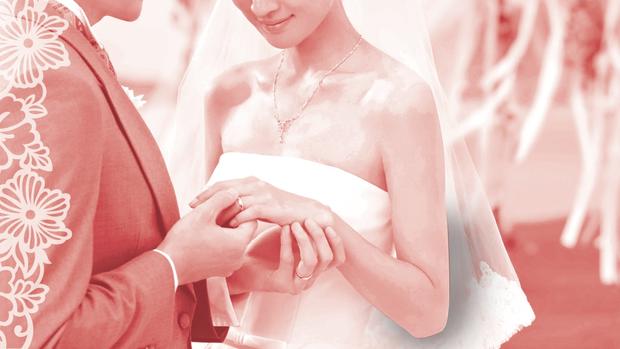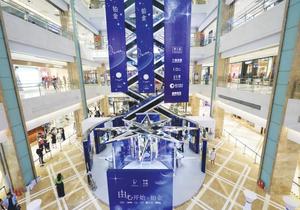COVID-19 has forced many couples in Hong Kong to scrap or put off their nuptials on safety concerns. While the city’s wedding industry is at low ebb, that on the mainland is flourishing as the pandemic eases. Edith Lu reports from Hong Kong.

If superstition — long entrenched in a Chinese community like Hong Kong — is to be religiously adhered to, 2020 is supposed to be an auspicious year for couples intending to tie the knot. It has a leap month and a double spring with two days marking the start of spring.
October was supposed to be the cherry on top and most sought-after wedding month of the year, with three zeroes (102020) symbolizing perfection and satisfaction.
However, it turned out not to be the case. Dark clouds continue to hover nearly a year after COVID-19 unleashed its fury, battering businesses and shattering dreams. Couples in Hong Kong have been forced to cancel, scale down or put their marriages on the back burner after news broke in March that wedding parties emerged as fertile ground for the transmission of the coronavirus.
According to the Immigration Department, the number of marriage registrations plunged by 44 percent to 15,581 in the first eight months, from 27,698 during the same period in 2019.
Extra expenses
Pency Pun, who planned to walk down the aisle in March, has put her wedding on ice and has yet to set a new date, saying everything remains uncertain.
The special administrative region government decided in late March to restrict the number of guests at wedding ceremonies to 20 after four people who attended a banquet came down with the virus. The curbs were relaxed in May, but they were tightened again two months later, as Hong Kong implemented its toughest social-distancing measures after the third wave of COVID-19 infections struck.
“We’ve been checking the latest social-distancing measures every week to see if we can proceed, but it’s like waiting to win a lottery,” laments Pun.
Many other engaged couples face the same dilemma. Nearly 400 couples submitted a petition to the government in early October, demanding that the limit on the number of people attending wedding receptions be eased.
A slight relief came on Oct 23, when the authorities allowed a maximum of 50 people to join a wedding ceremony as local infection cases dwindled, but food and drinks are still barred.
Pun estimates she would have to pay 20 percent more if she were to reschedule her wedding, as she would have to forfeit handling fees on some non-refundable items. Besides, due to the limited number of guests allowed, she’ll need to pay another HK$50,000 (US$6,449) if she wants to livestream the event for those who can’t attend.
 A promotional event for platinum jewelry gets under way in a shopping mall in Huizhou, Guangdong province, in November 2019. (PHOTO PROVIDED TO CHINA DAILY)
A promotional event for platinum jewelry gets under way in a shopping mall in Huizhou, Guangdong province, in November 2019. (PHOTO PROVIDED TO CHINA DAILY)
According to online lifestyle platform ESDlife, Hong Kong’s wedding market was worth HK$18.2 billion last year. The average cost of tying the knot was HK$369,166 — a slight rise of 2 percent year-on-year. The expenses covered a banquet, the bride’s ring and jewelry, honeymoon, photography and wedding gowns.
A banquet would normally take up the lion’s share of the expenses — an average of HK$185,389, half of the entire bill.
Couples can save money as food and drinks are prohibited at ceremonies. But total wedding expenses this year are not much different from last year’s, said Casey Chow, senior marketing manager at ESDlife.
“Since most couples have to arrange their registration and the banquet on different dates, they may have to book wedding gowns, photography and makeup services twice, which would mean higher costs,” explained Chow. “Moreover, they have to pay extra for face masks and disinfectants for guests.”
Vivi Li, 28, who works at a brokerage, had her marriage registered last month, with only 10 guests attending. Her entire bill came up to HK$306,400, more than two-thirds of which went to jewelry.
After a trek on the romance path, wedding couples don’t mind spending a big sum on jewelry to show their affection for each other and seal the bond in their relationship, said Liu Zhenzhen, director of global corporate marketing at Platinum Guild International, a marketing organization for platinum jewelry.
“Travel restrictions have forced some couples to cancel their honeymoon and spend on jewelry. Others have scaled down their wedding ceremonies and would spend more on bridal jewelry,” said Liu.
The same is true for couples north of the border. According to a consumer survey by PGI, about 70 percent of respondents on the Chinese mainland were willing to spend the same amount of money or even more on jewelry amid the pandemic. More than 80 percent of consumers said they’re willing to spend the same or more on jewelry after the health crisis.
Data from Meituan — the mainland’s largest on-demand services provider by number of users — shows that orders for wedding jewelry during the eight-day National Day and Mid-Autumn Festival holidays in October soared by 137 percent over the same period last year.
Rebound on mainland
With the coronavirus effectively under control on the mainland, large wedding gatherings have been allowed. The wedding industry rebounded during the “golden week”, which is traditionally a peak wedding season.
Wedding services provider Hunliji said more than 600,000 couples held wedding ceremonies during the “golden week” public holidays — up 11.2 percent from the same period last year.
A resident in Guizhou province went viral after he said he attended 23 weddings and spent a month’s salary on gifts, plus other expenses. Rising demand has pushed up the costs for a wedding ceremony. As some small wedding planning companies and hotels have closed down, couples have to book everything earlier at higher prices.
Popular wedding venues like hotels with outdoor lawns need to be booked 12 to 18 months in advance, while those in Beijing’s Chaoyang district are said to have been fully booked until June next year.
Photographers and makeup artists are also in demand. A wedding makeup artist reportedly made 120,000 yuan ($18,000) from 14 weddings during the “golden week” holidays.
The wedding industry has placed its hopes on the yearend festive season to recoup the losses for the whole year, and for a full recovery in 2021.
Contact the writer at edithlu@chinadailyhk.com


